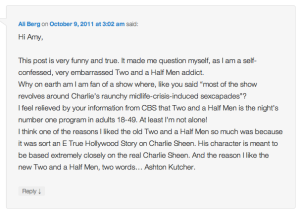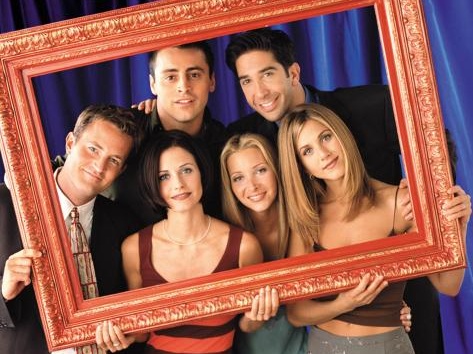“All television is educational television…” (Johnson, 1970). This report will display my understanding of TV’s academic history, vocabulary and debates. It will also delve into three key TV Studies concepts that I have found most interesting over this semester. It will begin by exploring TV’s depiction of family values and the traditional family. It will go on to discuss Reality TV. It will then cover “The Makeover”. Finally, this essay will reflect on my first blog entry and discover how far I have come over this semester.
A main concept that has been covered over the course is ‘traditional family values.’ I have explored these issues in my blog ‘Questioning family values.’ More so now than ever, the idea of the ‘traditional family’ has been questioned on TV shows using scenes, characters and story lines to parallel traditional family debates. Throughout this semester I was particularly interested in the case study of True Blood, which displayed these underlying debates.
In Week 5, we had a lecture on True Blood. We learnt in this lecture that the context of race and sex in True Blood reflects the contemporary debates about gay marriage as well as history of conflict on racial integration and civil rights in the South. In William Irwin’s book, True Blood and Philosophy, he explains the parallels between True Blood vampires and Gay people. He says a lot of them choose to stay “in the closet/coffin” because coming out means you might “suffer limitations on, or even the outright loss of, your societal rights and privileges.” Irwin also says the fight over who has the right to marry, a primary concern of homosexuals, “finds an almost exact parallel in the debate over human-vampire unions in True Blood.” (Irwin 2011). Irwin also brings up parallels between The Equal Rights Amendment and the Vampire Rights Amendment (VRA). Finally, Irwin explains that True Blood’s opening sequence shows a billboard that converts the famous antigay slogan of Westboro Baptist Church in Topeka “God hates fags” to “God hates fangs.”
In an article in the New York Post, Charlaine Harris, author of the best-selling novel Sookie Stackhouse (which True Blood was based on) explains she hoped fans would pick up on the link between vampire rights and gay rights when she published the first book in 2001. “When I began framing how I was going to represent the vampires, it suddenly occurred to me that it would be interesting if they were a minority that was trying to get equal rights. It just seemed to fit with what was happening in the world right then.” (Harris. Cited in Shen 2009)
In the book A Taste of True Blood, the parallel of the earlier civil rights struggle in the South is described. The book explains that there are three major shots in the opening credits of True Blood that touch on the civil rights struggle of the South. The first is a white policeman carrying away a black protester by his arms and legs. The second is a shot of a cute young boy dressed up in Klu Klux Klan regalia, complete with white hood. The very next image we see is of a middle-aged man in a rocking chair. He is possibly the little boy grown up. The final image along this theme is a cross-ignited in flames. The burning cross is another image of the Klu Klux Klan. All these images leave us with “the inescapable notion that this organized hate continues in the New South and that it’s not just vampires who need to keep looking over their shoulders.” (Lima, Wilson, Clifton. 2010)
In week ten we studied reality TV and it’s origins and contexts. I discussed this in my blogs: Reality TV contestant: everyone’s secret dream-job and Big Brother: Smartest TV show of all time? Discussed in the lecture, which was particularly interesting to me, was the appeal of reality TV to the audience. We learnt that there were many appeals, including spontaneity and the unscripted nature, the impression of authenticity, the local culture, voyeurism and participation. An example that we studied in the tutorial was Big Brother. Big Brother, based on Orwell’s 1984, is one of the most successful reality TV shows of all time. It has been a prime time hit in 70 countries. But there are still lots of questions as to what its appeal is. Many people still call it trash TV. In fact, in 2001 in France, a group calling themselves Activists Against Trash TV clashed with security guards during a raid on the set of Loft Story (France’s version of Big Brother). I will now attempt to uncover the appeal of reality TV, using Big Brother as an example.
Andy Bennett explains the appeal of Big Brother in his book Culture and Everyday Life. He says, “…As with the soap opera, part of the appeal of Big Brother undoubtedly relates to the fact it deals with issues that people are confronted with on a daily basis. The combination of television and internet platforms in Big Brother has created a collective experience characterized by a desire for everyday communality and by a rebellion against the norms of ‘civilized’ public culture. That desire, not provoked by exceptional events… but rooted in ordinary daily humdrum experience, forms the basis of Big Brother’s success.” (Bennett, 2005).
Steve Reicher, a social psychologist at St Andrews University in the UK says in an article in the Guardian “It’s very good sneer television and provides an opportunity for everyone to feel superior, If we want to evaluate ourselves in any way we can only do it through social comparison.”
The show also provides what psychologists call “safe danger”. The situations that crop up in the house allow us to talk about social dilemmas without being held accountable. “The notion that it’s real makes the discussion more real and removes one barrier to it being meaningful,” (Reicher. Cited in Adam. 2003). Finally, Annette Hill’s academic article indicates that the attraction to Big Brother is based on the social and performative aspects of the program. (Hill, 2002).
The final concept I will analyze is transformation narratives, or ‘the makeover.’ I speak about this in my blog: Dr 90210- we don’t want to see your surgeries. In week 11 we had a lecture on makeover shows. The show we analyzed was World’s Strictest Parents. One aspect we considered in the tutorials was the pedagogical and ideological ‘lessons’ of the show for participants and viewers. Something which I am extremely passionate about is body image role models for young girls. That is why I will be using cosmetic surgery makeover shows as my examples when examining the lessons learnt from makeover TV shows.
Fox aired The Swan in April 2004, a reality series including a competition in each episode between two women having multiple surgeries and culminating in a grand finale of a beauty contest that selected from the winners of each episode the ultimate woman, the swan. The E! Network came aboard with Dr. 90210 in July 2004, enhancing the format of cosmetic surgery reality television with the aura of Beverly Hills. In Ryan Bishop’s book Baudrillard now, he uses various theories to explain that watching these shows as a young child can severely damage self-confidence and body image.
In Richard Huff’s book Reality Television, he says, “In the case of The Swan or Extreme Makeover, they’re getting a huge amount of surgery at once that the average person couldn’t afford.” (Huff. 2006.) This encourages young and naive adults to waste their money on often unneeded surgeries.
Finally, the organization of psychiatry online explains, “reality shows such as “The Swan”and “Dr. 90210,” which feature plastic surgery and major makeovers,have been criticized for promoting unhealthy body image… It’s very unhealthy.” (Derenne and Beresin. 2006.)
In conclusion, I have learnt a tremendous amount about TV over the past semester. When looking back at my first blog entry about why I chose TV Cultures, it seems to me I just chose it because I had a love of sitting down in front of TV and watching episode after episode. I now have a much deeper knowledge and appreciation for TV. I understand that there is a whole world of academic history, debates and special vocabulary especially for TV. This has really been such an interesting and enjoyable learning experience, and I only wish there were more subjects like it I could have studied. I am proud to say that I can now be one of those “TV studies people” and join in on any TV conversation I want to!
References
- Johnson, Nicholas. How to talk back to your television set. Little, Brown, 1970.
- Irwin, William. True Blood and Philosophy. John Wiley and Sons. 2011.
- Shen, Maxine. Flesh and Blood, How HBO has turned hot vampires into gay-rights analogy. New York Post. June 23, 2009.
- Lima, Maria, Wilson, Leah and Clifton, Jacob. A Taste of True Blood: The Fangbangers Guide. BenBella Books, 2010.
- Bennett, Andy. Culture and Everyday Life. SAGE, 2005.
- Adam, David. What on earth is the appeal of Big Brother? The Guardian. 29 May 2003. UK.
- Hill, Annette Big Brother: the real audience. Television & New Media, 2003.
- Bishop, Ryan. Baudrillard now: current perspectives in Baudrillard studies. Polity. 2009.
- Huff, Richard M. Reality Television. Greenwood Publishing Group, 2006.
10. Jennifer L. Derenne, M.D. and Eugene V. Beresin, M.D. Body Image, Media, and Eating Disorders Academic Psychiatry. 2006.











